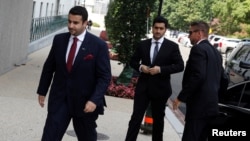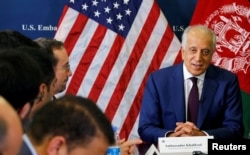Afghan peace talks held in the United Arab Emirates will yield "very positive results by the beginning of next year," the Saudi ambassador to Washington said Thursday, adding to hopes of progress to end the 17-year war in Afghanistan.
Khalid bin Salman added on his Twitter account that the talks were productive and would "help promote intra-Afghan dialog towards ending the conflict."
The U.S. special envoy for Afghan peace talks, Zalmay Khalilzad arrived in Kabul on Wednesday to meet government leaders following his discussions with Taliban representatives in Abu Dhabi earlier this week.
Officials from Saudi Arabia and the United Arab Emirates took part in the Abu Dhabi meeting, at least the third encounter between Khalilzad and Taliban envoys since he was named to oversee the peace effort from Washington's side in September.
In an interview with Afghanistan's Ariana Television, Khalilzad repeated that ideally, an agreement would be reached before presidential elections, currently scheduled for April 20.
But he said he had "questions on the Taliban, whether they are genuinely seeking peace.
"It's desirable to have a peace deal before the elections. But it's up to the Afghan government and the Taliban," he said, according to a transcript provided by the U.S. embassy in Kabul.
The United States insists that any peace settlement must be agreed between Afghans but the Taliban have so far publicly refused to talk directly to the Afghan government, which they say is an illegitimate, foreign-imposed regime.
U.S. troops
The urgency around the peace talks was heightened by President Donald Trump's unexpected decision this week, fulfilling a promise from his 2016 presidential election campaign, to withdraw U.S. troops from Syria.
According to Western diplomats in Kabul, there is concern among some U.S. allies that Trump may decide a similar move in Afghanistan and Khalilzad is widely believed to have until the middle of next year to come up with a settlement.
The United States hopes Saudia Arabia and the UAE can push Pakistan to use its leverage on the Taliban to drop their refusal to talk directly with the Afghan government.
Khalilzad said that during the meeting, the two countries had proposed a three-month cease-fire between the Taliban and the Afghan government.
"The Taliban did not commit on the cease-fire as they said they had to consult their senior leadership," he said.
"However, we encouraged them (that) in order to reach a quick peace agreement, they should come forward with a rapid positive response to the proposal of the UAE and SKA."






